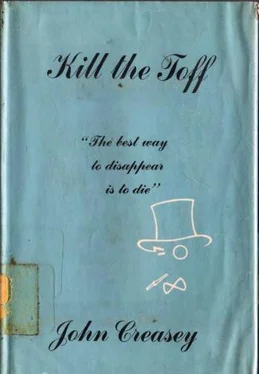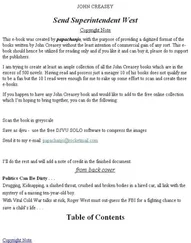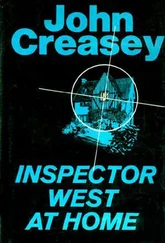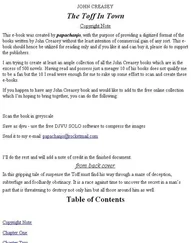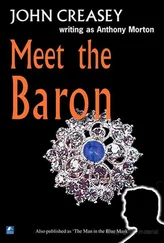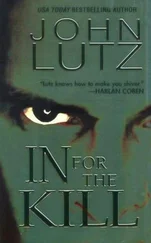John Creasey - Kill The Toff
Здесь есть возможность читать онлайн «John Creasey - Kill The Toff» весь текст электронной книги совершенно бесплатно (целиком полную версию без сокращений). В некоторых случаях можно слушать аудио, скачать через торрент в формате fb2 и присутствует краткое содержание. Жанр: Старинная литература, на русском языке. Описание произведения, (предисловие) а так же отзывы посетителей доступны на портале библиотеки ЛибКат.
- Название:Kill The Toff
- Автор:
- Жанр:
- Год:неизвестен
- ISBN:нет данных
- Рейтинг книги:5 / 5. Голосов: 1
-
Избранное:Добавить в избранное
- Отзывы:
-
Ваша оценка:
- 100
- 1
- 2
- 3
- 4
- 5
Kill The Toff: краткое содержание, описание и аннотация
Предлагаем к чтению аннотацию, описание, краткое содержание или предисловие (зависит от того, что написал сам автор книги «Kill The Toff»). Если вы не нашли необходимую информацию о книге — напишите в комментариях, мы постараемся отыскать её.
Kill The Toff — читать онлайн бесплатно полную книгу (весь текст) целиком
Ниже представлен текст книги, разбитый по страницам. Система сохранения места последней прочитанной страницы, позволяет с удобством читать онлайн бесплатно книгу «Kill The Toff», без необходимости каждый раз заново искать на чём Вы остановились. Поставьте закладку, и сможете в любой момент перейти на страницу, на которой закончили чтение.
Интервал:
Закладка:
One question mattered above all. If Mellor were arrested and charged, what would be the effect on Sir Frederick Arden? He believed that the tension and anxiety of the trial would kill the old man. That was the strongest single justification for trying to keep Mellor away from the police, for backing his own judgment.
Yes, he would have to do that if he could.
He saw Judith stir again and then the telephone bell gave a slight ring, the preliminary to steady ringing. He took the receiver off quickly before it had time to disturb the girl.
“Rollison speaking.”
“Hallo, Boss!” It was Snub who sounded bright and presumably had good news. “Still in the land of the live and kicking.”
“How did you get on?”
“What a stickler you are for business! All right. The police haven’t heard of the Asham Street incident yet and the Doc hasn’t been worried. Mellor’s out of danger from the carbon monoxide. I don’t think there’s much need for me to haunt this part of the great metropolis tonight.”
“You needn’t. But I want you to hire a shooting-brake or any kind of vehicle which will take a stretcher and garage it somewhere handy to the Doc’s place in the morning, very likely for use before daylight.”
“I’ll be ready at the crack.”
“Thanks,” said Rollison. “Keep a look-out for the police. I don’t want them to know what you’ve been up to. If they discover you’re going to drive a van or what-not, they might tumble to the truth. If your flat is watched, go to a hotel and let me know the telephone number.”
“Oke.”
“Off you go,” said Rollison.
“Oi, have a heart! How’s sweet Judy?”
“Sleeping,” said Rollison and glanced at the girl.
Her eyes, heavy with sleep, were wide open as she stared at him. He smiled at her, said good-bye to Snub and replaced the receiver. She gave an answering smile and eased herself upon the cushion. Her hair was unruly and absently she poked her fingers through it. There were red marks on her cheek where she had been lying on the creased cushion cover.
“Hungry?” asked Rollison.
She was startled. “Well, yes, I am.” She laughed, as if that astonished her.
“Good sign,” said Rollison. “I’ll be back in a moment.”
The sandwiches were under a silver cover, on a tray; the coffee was bubbling gently in the percolator. Rollison took the tray in and, as he pushed the door open with his elbow, saw Judith standing in front of the trophy wall.
Most of his visitors were fascinated by the collection of “exhibits”—the weapons and the souvenirs of old crimes and many modest triumphs. But Judith was paying no attention to the macabre contents of the wall: she was looking into a tiny mirror and powdering her nose.
“A very good sign,” said Rollison.
She turned. “What—Oh! I feel such a wreck.”
“Jim’s out of danger,” said Rollison.
Her whole face became radiant. She didn’t say: “Are you sure?” but closed her eyes for a moment and shook her head, as if she were driving an ugly vision away. Then she looked at him smiling, composed, happy.
“Thank heaven for that! Can I see him?”
“Not yet. You may or may not realise it, young woman, but the mirror you’ve been dolling yourself up in has a famous history. It belonged to a beauty who murdered three husbands with arsenic. The police couldn’t prove she’d ever possessed any arsenic and the mirror betrayed her—some was found along the leather edge. Now perhaps you’ll show a proper respect for that wall.”
Judith laughed. “I thought it seemed a bit grim. Mr Rollison, what are Jim’s chances of being acquitted?”
“Good, if we can stall long enough.”
“You’re not pretending?”
“It’s the simple truth. Eat your supper.” When she began to eat the sandwiches hungrily, he went on: “The police have asked you nearly every question that can be asked and I want to repeat some of them. Had you ever any reason to think that Jim was in difficulties?”
She said: “Absolutely none.”
“How often did you see him?”
“Practically every day. Once or twice he had to go away on business but he was never away for more than two nights. He’s the manager of a small firm of printers, you know.”
“Yes. Did you ever go to the works?”
“Several times.”
“Had he any business worries?”
“He was only worried about one thing, as far as I know, and I think I should have known had there been anything else,” said Judith. “The world situation sometimes got on his nerves. He had a rough time in the war and— well, you know what I mean. He thought everyone who talked of war was crazy and ought to be pole-axed. The news sometimes got him down.”
“ Was it just the news? Are you sure?”
“I’ve never questioned that,” said Judith quietly. “I don’t think there’s any doubt. I could usually guess when he’d been depressed; it would be a day when there was more cock-fighting among the United Nations or a flare-up somewhere in the world. I don’t think it was related to his personal affairs. He always said he felt so helpless—that it wouldn’t have been so bad if he could have done something about it himself.”
“I see,” said Rollison. “Did you know his friends?”
“One or two of them. I don’t think he had many.”
“Isn’t he a friendly type?”
“Yes; but he spent a lot of time at business, often worked late and he was rather—well, impatient of most people. He used to call himself the Superior Being. Oh, that wasn’t conceit! He would be laughing at himself because he hadn’t patience with a lot of social chatter and the usual table-talk—any of the conventional things.”
“How long have you known him?”
“Six months—just six months.”
“Has he ever talked about himself and what he did before that?”
“Of course. I think I know almost as much about him as he knows about himself. He wasn’t demobilised until two years after the war and he spent a year studying printing. His family are nearly all printers. But there wasn’t scope for him in the family business and he wasn’t satisfied with their old-fashioned methods anyhow, so he got this job outside. He’s good at it, you know, he’s no fool.”
“I’ll grant that,” said Rollison. “Did he know anyone from the East End of London?”
“I don’t think so—not well, anyhow. Why?”
“It could matter.”
“Well, the works are at Wembley and of course he had business all over London, so he’d know customers in the East End. I hadn’t given it much thought but I think he spent one day a week in that district—or part of a day. Bethnal Green and Whitechapel mostly, I believe. You could get all the details from the works.”
“Who’s managing the works now?” asked Rollison.
“The directors. The man I saw told me that they wouldn’t replace Jim yet but that was nearly a month ago when I went to see if they knew anything about him. The police hadn’t questioned me then and I couldn’t understand what had happened to him.”
“Do you remember the name of the man you saw there?”
“Yes,” said Judith. “Arthur Dimond. I— What’s the matter?” She looked alarmed when Rollison began to choke on a sandwich. “Have I said anything startling?”
“You’ve said plenty,” said Rollison, very softly, “and you’ve proved me a dumbwit, Punch! I haven’t given half enough attention to the business side. Dimond —without an “a”?”
“Yes. I know because it’s on the letter-heading of the company. Mr Dimond looked after another company and didn’t spend much time at Wembley. Is it important?”
“It might be,” said Rollison. “Have some coffee.”
Читать дальшеИнтервал:
Закладка:
Похожие книги на «Kill The Toff»
Представляем Вашему вниманию похожие книги на «Kill The Toff» списком для выбора. Мы отобрали схожую по названию и смыслу литературу в надежде предоставить читателям больше вариантов отыскать новые, интересные, ещё непрочитанные произведения.
Обсуждение, отзывы о книге «Kill The Toff» и просто собственные мнения читателей. Оставьте ваши комментарии, напишите, что Вы думаете о произведении, его смысле или главных героях. Укажите что конкретно понравилось, а что нет, и почему Вы так считаете.
